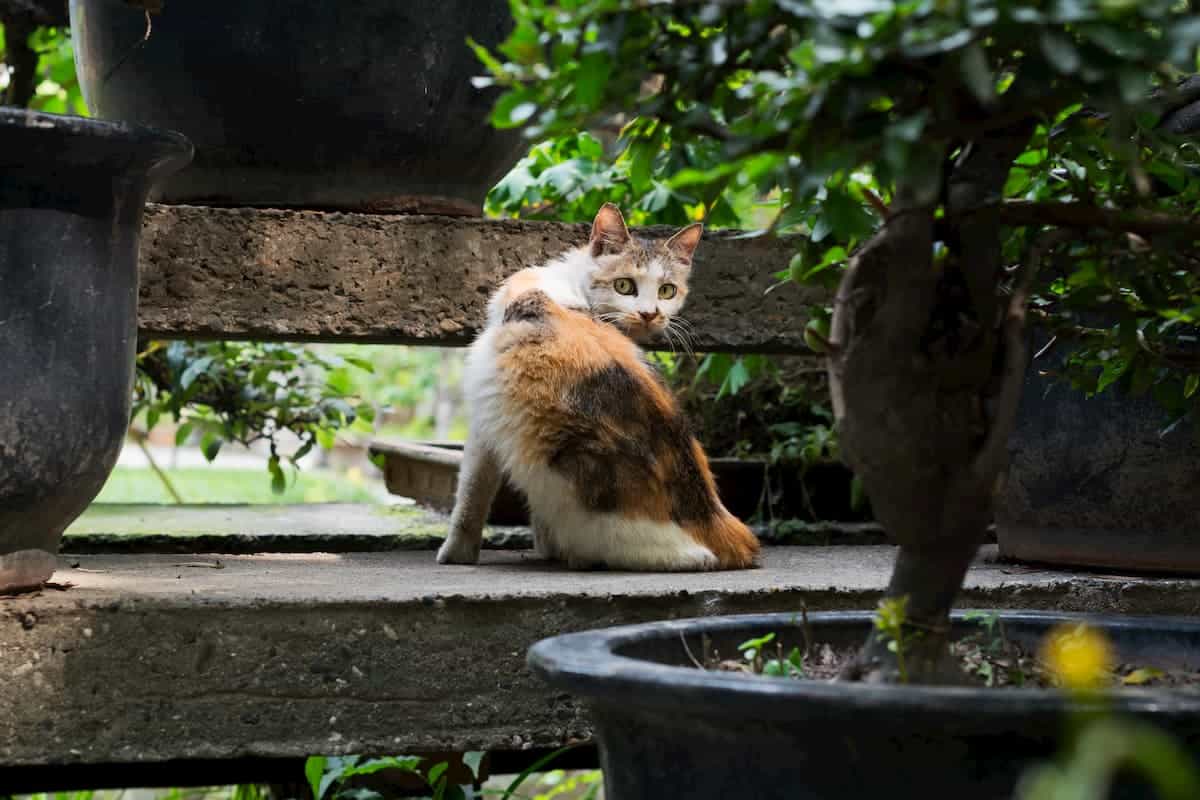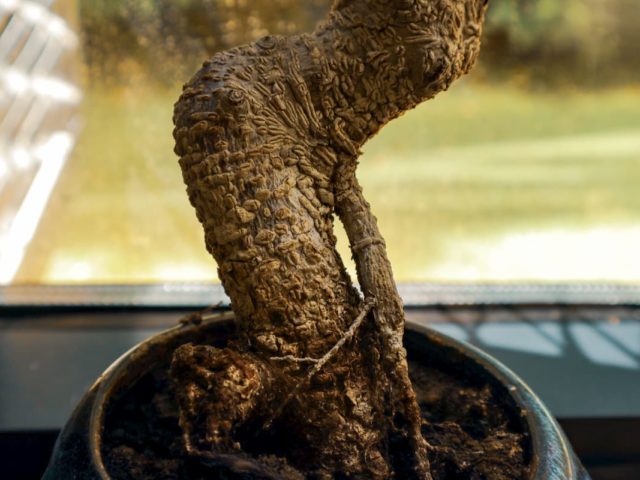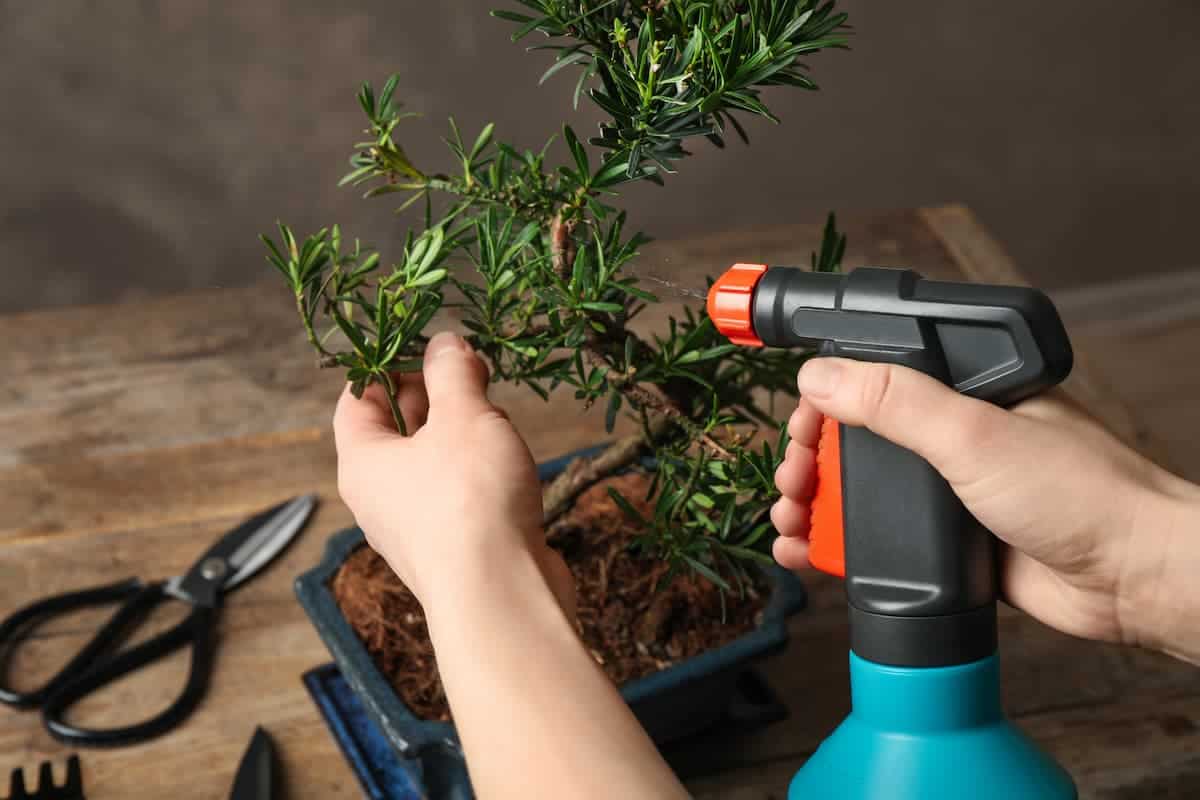A cat will chew on anything, from wires, and furniture to even plants. Miniature trees like bonsai trees are thus prone to cat attacks.
But if you are a cat parent, the least of your worries should be a few leaves or branches missing from your bonsai tree, so are bonsai trees poisonous to cats?
Most bonsai trees are poisonous to cats. If a cat should ingest the leaves, stems, or seeds of a bonsai tree it can go into shock and even die. If you choose to purchase a bonsai tree ensure you understand to save your pet!
But don’t be alarmed just yet. All bonsai trees are not toxic and with some preventive measures, you can protect your cat from being poisoned.
Read on and find out how to enjoy your bonsai grooming hobby peacefully, without the fear of your cat being poisoned.
Why Are Bonsai Trees Poisonous to Cats?
Some plants have an in-built defense mechanism to keep insects and animals away. Bonsai trees are no different. The toxins in these plants may not be harmful to humans but can be deadly to dogs and cats.
Many house plants contain cycasin, a toxin agent, which can seriously damage the liver of your cat. Sago Palm bonsai trees have a high concentration of cycasin.
If a seed or two of this bonsai is ingested by a cat or even a baby, there will be severe consequences.
But rest assured that not all bonsai trees are poisonous to cats. So, keep reading before throwing out your bonsai.
Symptoms That Your Cat is Poisoned from a Bonsai Tree
If your cat ingests any part of the toxic bonsai tree it will show some general symptoms. But in some cases, symptoms may vary depending on the type of bonsai tree.
Here are the general symptoms,
- Irritation, Rash or Discoloration in Skin
- Coughing
- Lethargy
- Urinating and drinking water more than normal
- Breathing problems
- Dilated Pupils
- Vomiting
- Tremors or Seizures
- Shivering
- Slow Heart Rate
- Diarrhea
- Gastrointestinal Irritation
- Black stool
- Depression (Your cat will seem disinterested in grooming or will be sleeping more)
Vomiting and Diarrhea occur when the toxicity levels are high. Again, some of these symptoms can appear late. Meaning your cat will not be able to throw up these toxins in time.
By the time you figure out the reason behind the symptoms, it can be too late. So, you must keep an eye on your cat if you have bonsai trees at home.

What to Do When your Cat is Poisoned From a Bonsai Tree?
If you find any leaf or branch missing from your bonsai or any of your other plants, look for your cat. Then try to gently extract any vegetation that may be left in your cat’s mouth.
You may try to wash the cat’s mouth gently with water. But only do this if you are confident. Do not try to induce your cat to vomit unless health professionals instruct you to do so. One wrong step can make things worse.
Call your vet immediately if you see symptoms of poisoning in your cat. You can also call a pet poison control clinic or emergency veterinary services. Keep these emergency numbers jotted down somewhere beforehand.
Try to take a sample of the plant your cat nibbled on to the vet. Knowing the specific bonsai tree or plant that your cat ate will help in the treatment process. Because different types of toxic plants have different types of treatments.
Tell your vet the symptoms you observed in your cat and for how long they persisted. You should also ask him if there needs to be any change in the diet of your cat.
Bonsai Trees Poisonous for Cats
If you love the art of bonsai but have little kittens at home, you need to do your research on which bonsai trees are toxic and which are not.
Lucky for you, I have jotted down the most common poisonous bonsai trees for cats below.
Sago Palm Bonsai Tree
Every part of the Sago Palm Bonsai tree is poisonous. Its seeds are especially more toxic. It contains a high amount of cycasin which is an active toxin agent.
If your cat nibbles on this plant, 15 minutes later your cat will show symptoms of poisoning. Drooling, vomiting, diarrhea, jaundice, and black tar-like stool are symptoms of sago palm poisoning.
Chinese Rubber Plant
The Chinese rubber plant or baby jade are small succulents that make a great home decoration. But if ingested by your cat it can cause serious damage.
Every part of the jade is poisonous for your cat.
If it eats jade leaves, symptoms like slow heart rate, vomiting, and slow heart rate will appear.
These general symptoms can also induce symptoms related to depression such as disinterest in grooming, increased aggression, sleeping, and hiding more than usual.
Fig Bonsai Tree
Fig is harmless for humans but it can be toxic for cats. The leaves, seeds, and stems of a fig tree can be mildly poisonous to cats but they will not cause death.
Skin irritation, vomiting, excessive drooling, and diarrhea are signs of fig poisoning in cats.
Azalea (Rhododendron)
Azaleas make for beautiful bonsai trees but these are lethal for both cats and humans alike. If you choose to groom an Azalea you must keep it out of the reach of babies and cats.
Cats show signs of poisoning a few hours after ingesting Azalea plants. Primary symptoms are drooling, diarrhea and vomiting.
If the case gets worse this may lead to severe tremors, seizures and even falling into a coma!
Plum Bonsai Tree
Plums are tasty and completely harmless for humans. But both the fruit and the plant are toxic to cats. Because plums consist of cyanide.
Vomiting, shortness of breath, dilated pupils, and going into shock are signs of poisoning from a plum bonsai tree. Bright red gums are a symptom special to this type of toxic bonsai poisoning.
If you think your cat ingested a plum, call the vet immediately. Because this type of poisoning can result in even death.
It is crucial to tell the vet how much time passed after the cat ate the plant.
Bonsai Trees Safe for Cats
Say goodbye to all your misconceptions regarding bonsai trees. You no longer have to stop yourself from getting that perfect bonsai tree because you are a cat parent.
You can indulge the bonsai grooming enthusiast in you by opting for non-toxic bonsai. Keep your cat safe and your heart glad by adding these non-toxic bonsai trees instead that include:
- Prayer Plant
- Juniper Bonsai Tree [ Bonsai Boy Specialty Shop ] and [ Amazon ]
- Hibiscus
- Japanese Palm Tree
- Christmas Cactus
- Bamboo Palm Bonsai Tree
- Peperomia Green Bonsai
- Money Bonsai Tree
- Parlour Balm Bonsai Tree
- Carmona Bonsai Tree (Fukien Tea)
How to Keep Your Bonsai Trees Safe From Your Cat?
Keep your bonsai trees in a place that is out of your cat’s reach. Domesticated home cats usually do not venture outside, in that case, you should keep your bonsai trees outside (if you can).
But cats are very agile creatures and curious by nature. They can jump to great heights and squeeze into any small space. Do, just keeping your bonsais out of their reach is not enough.
Use some sort of animal repellent sprays on your bonsai trees. You can use citrus sprays or keep orange peels around your bonsai. Cats hate the smell of anything citrusy.
You can also create a physical barrier around your bonsai to protect it from your cat. Since you are into gardening, why not plant some catnip? The catnip will divert your cat’s attention from other plants.
Keep an eye on your bonsai tree. If any leaf or branch is missing or out of place, you need to track down your cat.
Final Thoughts on Are Bonsai Trees Poisonous to Cats
For many looking to add a nice high-quality look into their house, a bonsai tree can be near perfect. With this decision though comes taking everything in the house into the equation for safety.
With pets and young children, this is especially important as they tend to be less observant and more touchy with plants and items which could lead to some serious consequences.
Take care and find the perfect plant for your home so that you can enjoy it for years and decades to come!





